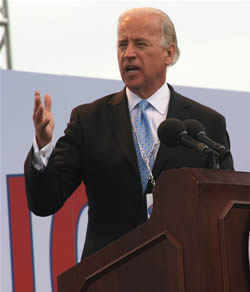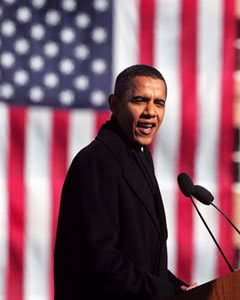
|
America's Next President:
Beware of The Battered Wife Syndrome
For Sunday November 9, 2008
Lectionary Readings (Revised Common Lectionary, Year A)
Joshua 24:1–3a, 14–25 or Wisdom of Solomon 6:12–16 or Amos 5:18–24
Psalm 78:1–7 or Wisdom of Solomon 6:17–20 or Psalm 70
1 Thessalonians 4:13–18
Matthew 25:1–13
 |
John McCain. |
The luck of the lectionary this week features Joshua and a story about the transition of political power in Israel. It's a remarkably salient text as America votes for its next president. What might we expect with a new president? What might we hope? With record low approval ratings for Bush (28%) and Congress (15%), and only 9% of the country saying that America is "headed in the right direction," expectations are high.
The bloody book of Joshua begins with the death of Moses and the ascension of his aide-de-camp. The first half of the book is a triumphalistic history of military conquests; the second half details the division of the conquered lands among the twelve tribes of Israel. The story ends with Joshua's death and a plea for political sanity: "Fear the Lord and serve him with all faithfulness. . . . Choose for yourselves this day whom you will serve. … As for me and my household, we will serve the Lord" (Joshua 24:14,15).
That plea fell on deaf ears. The people were enthusiastic, but Joshua was dubious. Moses had led Israel in exodus out of Egyptian bondage, whereas under Joshua the oppressed became the new oppressor. His genocidal campaigns "left no survivors. He totally destroyed all who breathed" (Joshua 10:40). Cities were burned, vanquished kings were publicly hanged, wealth was plundered, and peoples were enslaved. "Extermination without mercy" (11:20) was the stated goal. Divine approval was the putative rationale.
Instead of political sanity, the reign of Joshua was followed by catastrophe — the period of the judges. In a single generation after the death of Joshua, Israel descended into 400 years of anarchy where, in the words of the very last sentence of the book, "every person did what was right in his own eyes" (Judges 21:25, 17:6). Israel's genocides had unleashed the dark forces of its own destruction.
 |
Joe Biden. |
In its religious life “the word of the Lord was rare” (1 Samuel 3:1), whereas idolatry was rampant. Debauchery characterized civic morality. Judges chapter 19, for example, records the murder of a nameless woman who was gang raped all night and then dismembered, a crime so heinous that it subsequently provoked a civil war within Israel. "Think about it!" exclaims the narrator, "Consider it! Tell us what to do!" (Judges 19:30). On the economic front there were famines. It would take many long centuries before King David united the country.
What awaits America's own presidential transition? The country is overwhelmingly united in its discouragement and cynicism, but bitterly divided down the middle by partisan ideologies of the left and right. In a new book called The Limits of Power; The End of American Exceptionalism (2008), Andrew Bacevich advises us to look beyond and beneath the propaganda of both Republicans and Democrats.
I discovered Bacevich by reading The New American Militarism; How Americans Are Seduced By War ( 2005), a book in which he describes how America's normalization and even romanticization of war "pervades our national consciousness and perverts our national policies." A veteran of Vietnam and subsequently a career officer, a graduate of West Point and later Princeton where he earned a PhD in history, director of Boston University's Center for International Relations, Bacevich has described himself as a cultural conservative who views mainstream liberalism with skepticism, but who also is a person whose "disenchantment with what passes for mainstream conservatism, embodied in the Bush administration and its groupies, is just about absolute." He's also described himself as a "conservative Catholic."
 |
Sarah Palin. |
Bacevich's newest book is a white hot polemic that describes just how badly broken America is today. His prophetic ire finds some vindication in that the book was published only a few months before Wall Street imploded. You might argue that he doesn't say much that's new, but you'd be hard pressed to find someone who says it with such passion, erudition, eloquence and, sometimes, sarcasm.
The end of the Cold War was thought to have ushered in a Long Peace, with the sole superpower arrogating itself to the task of reshaping the world in its own image. In reality, in the aftermath of 9/11, the Bush administration initiated a Long War against global terrorism that Bacevich calls a "permanent condition." This is a war, he says, "of no exits and no deadlines." This Long War in general, and the Iraq War in particular, have laid bare deep contradictions and dysfunctions in America.
The root of America's crisis rests in a facile notion of freedom. For most citizens, freedom means the sacred right to consume. But this misguided, unexamined and sacred tenet has led to "three interlocking crises" — economic and cultural, political, and military. After a brief introduction, Bacevich devotes a chapter to each crisis.
The cultural-economic crisis expresses itself in wholesale profligacy, "a relentless personal quest to acquire, to consume, to indulge, and to shed whatever constraints might interfere with those endeavors." Our profound addiction to cheap oil, easy personal credit, massive trade imbalances between what we export and import, and the runaway federal debt characterize this profound profligacy. In politics, we've witnessed the concentration of power in the executive branch, the deterioration of meaningful checks and balances, a feckless and dysfunctional congress, and appalling incompetence in overall government (cf. Katrina, health care, social security, immigration). Aggravating this political crisis is an overall "national security ideology" which specializes in disinformation and marginalizing dissent. Bush, says Bacevich, is not to blame; he merely inherited and expanded this tendency, and it's a tendency that successive presidents will surely follow. In his analysis of our military crisis, Bacevich details our illusions about war mongering and the lessons, real and imagined, that we ought to learn from Afghanistan and Iraq (where "we are playing a losing hand").
 |
Barack Obama. |
Will our new president and congress make a difference? Can we wipe the slate clean and put the nation back on track? Bacevich dismisses this as "the grandest delusion of all," for it turns a blind eye to decades of dysfunction, whether under Reagan and Bush or Carter and Clinton. Rearranging the deck chairs will not solve America's problems. We would do far better to rearrange our high expectations.
"There is something touching about these expectations," Bacevich concludes at the end of his tirade, "but also something pathetic, like the battered wife who expects that this time her husband will actually keep his oft-repeated vow never again to raise his hand against her" (172–173). The abused wife, of course, is co-dependent, and only when she assumes control of her own life will conditions change. "Something of the same can be said of the American people."
Whether the presidential candidate you voted for won or lost, all Christians everywhere can join together in one prayer: "Lord, Andrew Bacevich may be right in his analysis, but may he be wrong in his dire conclusion that significant change for a better America is impossible."
For further reflection
The following books have all been helpful to me and are reviewed here at JwJ:
* Gregory A. Boyd, The Myth of a Christian Nation; How the Quest for Political Power is Destroying the Church.
* Chalmers Johnson, Blowback; The Costs and Consequences of American Empire; Nemesis: The Last Days of the American Republic; and The Sorrows of Empire: Militarism, Secrecy, and the End of the Republic.
* David Kuo, Tempting Faith; An Inside Story of Political Seduction.
* Jon Meacham, American Gospel; God, the Founding Fathers, and the Making of a Nation.
Image credits: (1) EverythingAlabama.com; (2) Hardeman County (Tennessee) Democratic Party; (3) TheodoresWorld.net; and (4) Electricity and Lust WordPress blog.





